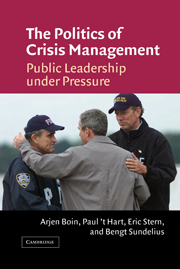Book contents
- Frontmatter
- Contents
- List of figures and table
- Acknowledgments
- 1 Crisis management in political systems: five leadership challenges
- 2 Sense making: grasping crises as they unfold
- 3 Decision making: critical choices and their implementation
- 4 Meaning making: crisis management as political communication
- 5 End games: crisis termination and accountability
- 6 Learning from crises and the politics of reform
- 7 How to deal with crisis: lessons for prudent leadership
- References
- Index
1 - Crisis management in political systems: five leadership challenges
Published online by Cambridge University Press: 22 September 2009
- Frontmatter
- Contents
- List of figures and table
- Acknowledgments
- 1 Crisis management in political systems: five leadership challenges
- 2 Sense making: grasping crises as they unfold
- 3 Decision making: critical choices and their implementation
- 4 Meaning making: crisis management as political communication
- 5 End games: crisis termination and accountability
- 6 Learning from crises and the politics of reform
- 7 How to deal with crisis: lessons for prudent leadership
- References
- Index
Summary
Crisis management and public leadership
Crises come in many shapes and forms. Conflicts, man-made accidents, and natural disasters chronically shatter the peace and order of societies. The new century has brought an upsurge of international terrorism, but also a creeping awareness of new types of contingencies – breakdowns in information and communication systems, emerging natural threats, and bio-nuclear terrorism – that lurk beyond the horizon. At the same time, age-old threats (floods, earthquakes, and tsunamis) continue to expose the vulnerabilities of modern society.
In times of crisis, citizens look at their leaders: presidents and mayors, local politicians and elected administrators, public managers and top civil servants. We expect these policy makers to avert the threat or at least minimize the damage of the crisis at hand. They should lead us out of the crisis; they must explain what went wrong and convince us that it will not happen again.
This is an important set of tasks. Crisis management bears directly upon the lives of citizens and the wellbeing of societies. When emerging vulnerabilities and threats are adequately assessed and addressed, some potentially devastating contingencies simply do not happen. Misperception and negligence, however, allow crises to occur. When policy makers respond well to a crisis, the damage is limited; when they fail, the crisis impact increases. In extreme cases, crisis management makes the difference between life and death.
- Type
- Chapter
- Information
- The Politics of Crisis ManagementPublic Leadership Under Pressure, pp. 1 - 17Publisher: Cambridge University PressPrint publication year: 2005
- 1
- Cited by



